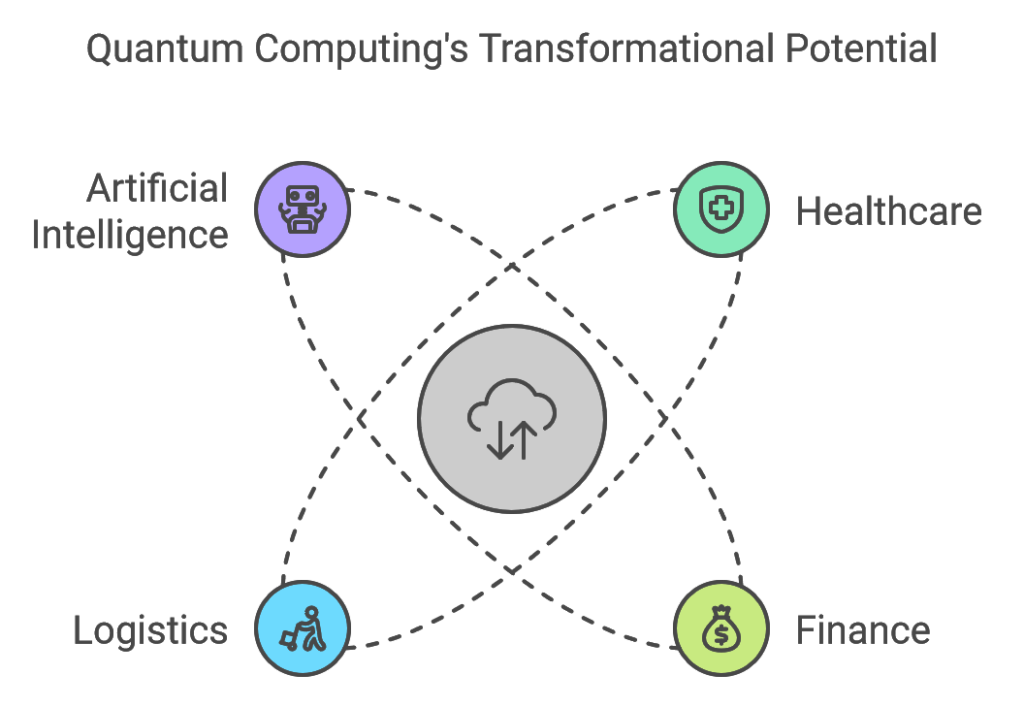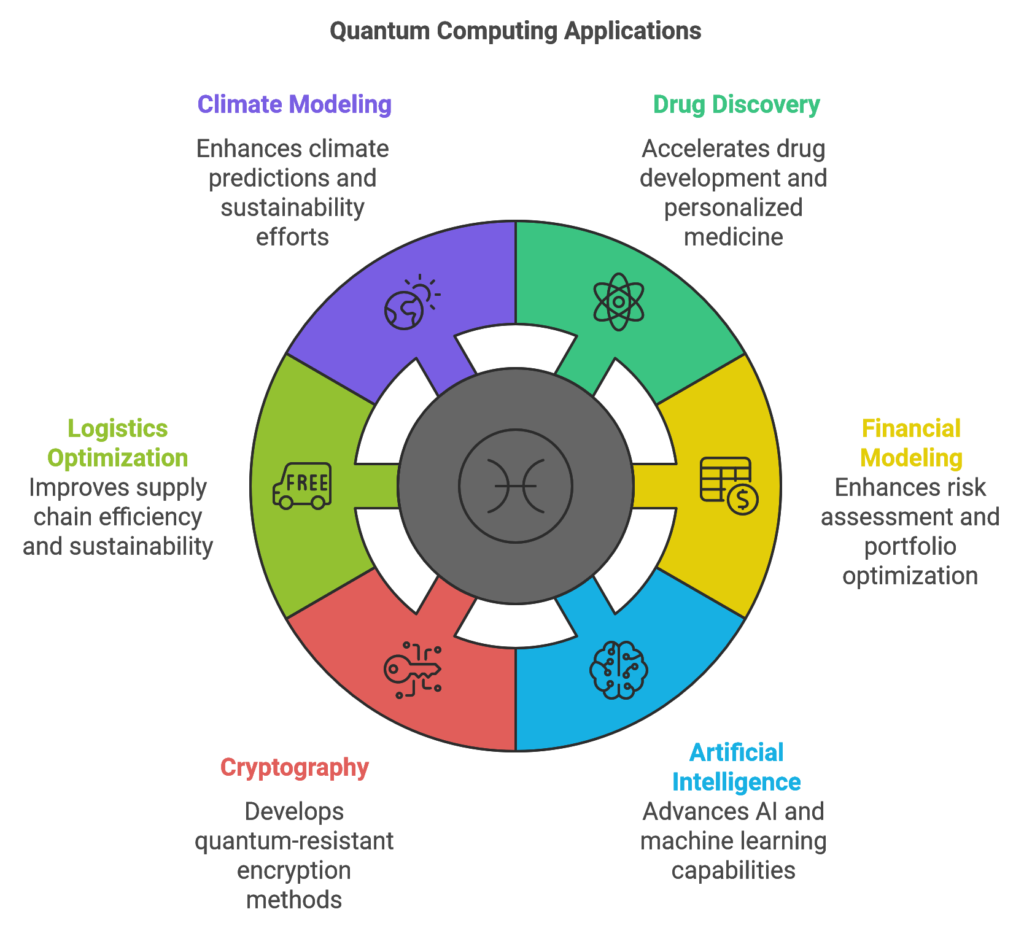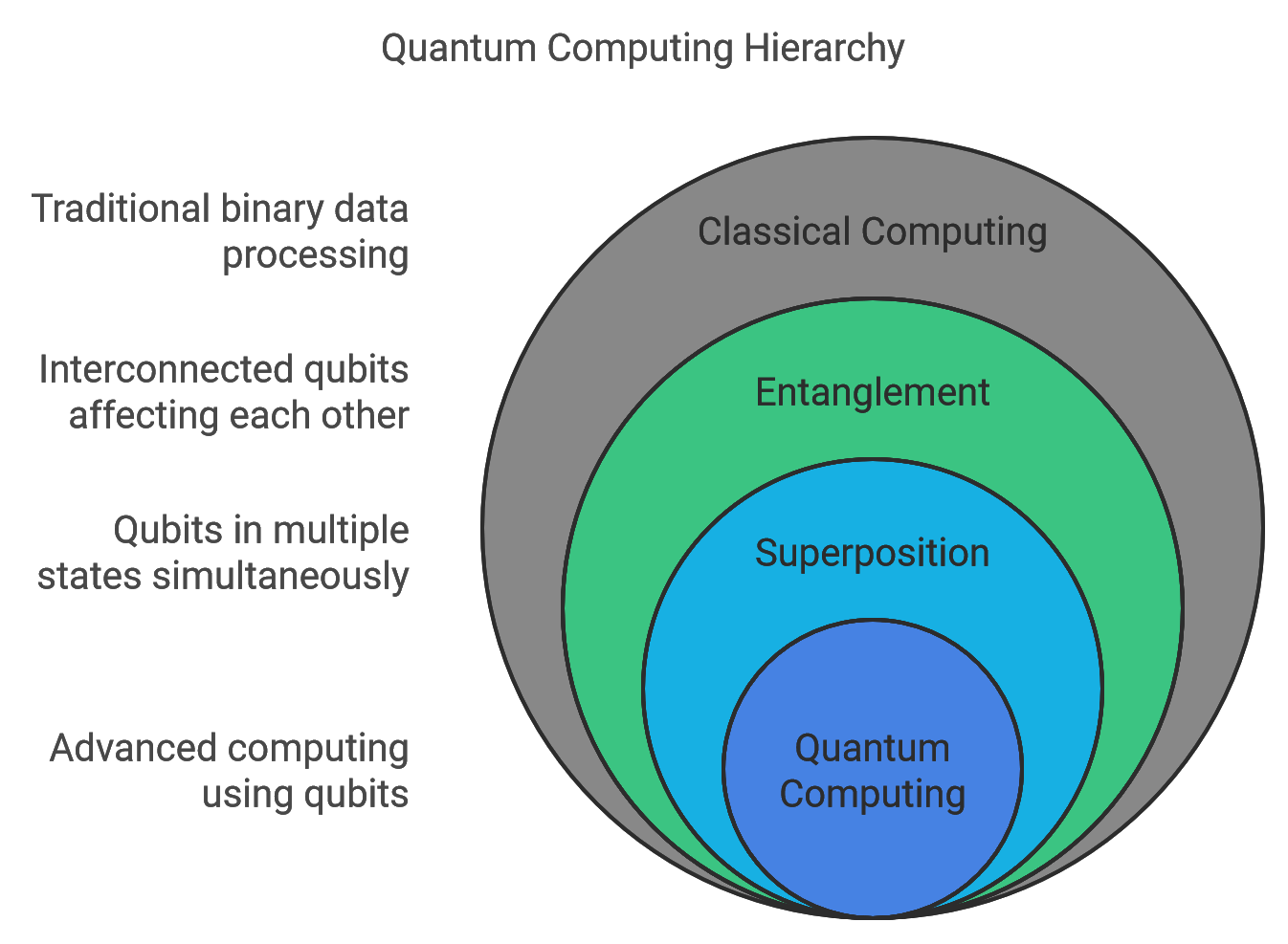Quantum computing stands at the frontier of a technological revolution, promising to redefine our understanding of computing and accelerate innovations across almost every industry. Unlike classical computers, which process data in a linear way, quantum computers harness the principles of quantum mechanics to solve complex problems at speeds unimaginable to traditional systems. Though quantum computing is still in its infancy, its potential impact on fields like healthcare, finance, logistics, artificial intelligence, and more is already becoming evident.
In this post, we’ll explore the basics of quantum computing, its potential applications, and how it could transform industries worldwide.

What Is Quantum Computing?
To understand quantum computing, it helps to start with the basics of traditional computers. Classical computers process data in binary form, using bits that represent either 0 or 1. These binary instructions build programs, perform calculations, and allow the computer to perform tasks sequentially.
Quantum computers, however, operate with quantum bits or “qubits,” which can represent both 0 and 1 simultaneously through a phenomenon known as superposition. This property allows quantum computers to process multiple possibilities simultaneously, vastly increasing computational power. Quantum systems also leverage entanglement, where qubits become interconnected in such a way that the state of one qubit affects the state of another, even at a distance. This interconnectedness allows quantum computers to handle complex calculations with much greater efficiency than classical computers.
Why Quantum Computing Matters
Quantum computing matters because it’s not just about being faster—it’s about solving problems that classical computers can’t feasibly tackle due to their complexity. This technology has the potential to crack problems that would take classical computers thousands of years to solve, making it uniquely powerful for applications involving vast datasets, optimization, or the simulation of complex systems.
For example, molecular modeling for drug discovery, weather prediction, cryptography, and financial modeling involve calculations of extreme complexity. With classical systems, these calculations are impractical, but quantum computers could complete them within seconds or minutes.
Potential Applications of Quantum Computing
Here’s a closer look at some areas where quantum computing is likely to make the most significant impact:
1. Drug Discovery and Healthcare
Quantum computing could revolutionize healthcare by accelerating drug discovery and enabling personalized medicine. Quantum algorithms can simulate molecular structures and interactions, helping researchers understand how molecules will interact with each other. This capability allows for faster development of new medications and therapies.
- Example: IBM’s quantum team is working on developing quantum algorithms that can simulate small molecules, a significant step toward simulating more complex biological systems like proteins. By identifying potential drug compounds more quickly, quantum computing could drastically shorten the time and cost of bringing new medicines to market.
2. Financial Modeling and Risk Analysis
Financial markets are complex, dynamic, and filled with uncertainty. Quantum computing could enable real-time risk assessment and portfolio optimization by rapidly analyzing large datasets and performing sophisticated calculations. Quantum computers can also simulate financial scenarios with greater accuracy, providing a competitive edge for financial institutions.
- Example: Goldman Sachs is collaborating with quantum computing companies to explore how quantum algorithms can be applied to improve options pricing and risk analysis, helping to anticipate financial risk with more precision.
3. Artificial Intelligence and Machine Learning
Quantum computing has enormous potential to advance artificial intelligence (AI) and machine learning (ML). These applications often rely on optimization, pattern recognition, and large dataset analysis, tasks that quantum computers could perform more efficiently. Quantum algorithms could also allow for more advanced models in neural networks, improving AI capabilities.
- Example: Google’s quantum AI lab is exploring how quantum machine learning can improve pattern recognition, which could lead to faster, more efficient AI systems for applications like natural language processing, image recognition, and predictive analytics.
4. Cryptography and Cybersecurity
Quantum computing poses both opportunities and challenges in cryptography. While it could enable the development of quantum-resistant encryption methods, it also threatens current cryptographic standards. A sufficiently powerful quantum computer could break widely-used encryption methods, like RSA, in minutes. This development is prompting the shift to post-quantum cryptography, which aims to secure data against quantum threats.
- Example: The U.S. National Institute of Standards and Technology (NIST) is developing new encryption standards that will be resistant to quantum computing attacks, ensuring data remains secure even in a quantum-powered future.
5. Logistics and Supply Chain Optimization
Supply chains are complex systems with numerous variables, from inventory levels and shipping routes to delivery schedules. Quantum computing can optimize these processes by solving routing and scheduling problems faster, which is essential for companies with global supply chains. This efficiency could reduce costs, improve delivery times, and minimize carbon footprints.
- Example: Volkswagen has experimented with quantum algorithms to optimize traffic flow in cities. By improving route planning and reducing traffic congestion, quantum computing can make urban transportation more efficient and sustainable.
6. Climate Modeling and Sustainability
Predicting climate patterns involves massive datasets and complex variables, making it an ideal application for quantum computing. Quantum systems could process environmental data with greater accuracy, helping scientists predict weather changes, model environmental impacts, and develop solutions for climate resilience.
- Example: Quantum computing could be used to improve carbon capture technology or simulate the environmental impact of policies, enabling governments and organizations to make data-driven decisions for sustainability.

Challenges and Limitations of Quantum Computing
Despite its immense potential, quantum computing faces several challenges that must be addressed before widespread adoption can occur:
1. Technological Complexity
Quantum systems require highly specialized and stable environments to function, often involving extreme temperatures close to absolute zero. This technical complexity makes building and maintaining quantum computers challenging and costly.
2. Error Rates
Quantum computing is prone to high error rates due to quantum decoherence, where the qubits lose their quantum state due to interference from their environment. Researchers are developing error-correcting algorithms, but perfecting these is a considerable challenge.
3. Scalability
Building a scalable quantum computer that can handle millions of qubits is still a significant hurdle. Current quantum computers are in the range of tens or hundreds of qubits, but achieving the processing power needed for large-scale applications will require substantial advancements in quantum hardware and error correction.
4. Workforce and Expertise
Quantum computing requires a highly specialized skill set that combines quantum mechanics, computer science, and engineering. As a result, there is a shortage of quantum computing talent, which could slow the pace of innovation.
The Future of Quantum Computing
Quantum computing may still be in its early stages, but major technology companies like Google, IBM, and Microsoft, as well as startups, are racing to unlock its potential. As these companies make advancements in hardware, software, and algorithms, the gap between experimental applications and real-world impact is narrowing.
Looking forward, we can expect to see more partnerships between tech firms, government agencies, and industries that will accelerate the development of quantum applications. There is also likely to be increased investment in quantum research, alongside new educational programs designed to develop a quantum-literate workforce.
Conclusion: Quantum Computing’s Transformational Potential
Quantum computing isn’t just an upgrade to classical computing—it’s a revolutionary technology that could redefine what’s possible across industries. From advancing healthcare to securing data, optimizing global logistics to developing sustainable solutions, the promise of quantum computing is immense.
As the field continues to mature, quantum computing will open doors to possibilities we’ve only begun to imagine, fundamentally altering the technological and economic landscape. While there are challenges ahead, the potential for groundbreaking innovation is more promising than ever. Quantum computing represents the next great leap forward in computing, one that could truly change everything.
